Joyce T. Strand's Blog, page 27
April 5, 2013
WHAT THE EXPERTS SAY: SciFi Author, John Ashley
 John Ashley, Author
John Ashley, AuthorTHE SCROLLS OF XAVIER
John Ashley isn’t sure what got him started writing, but he is sure he will never stop. His SciFi novel THE SCROLLS OF XAVIER is the first of the Xavier series and his first novel. He writes his books primarily to entertain by bringing “worlds, creatures, and technologies…believable and awe-inspiring.” But he also tries to teach something along the way, to broaden readers’ minds.
Q: What inspired you to write THE SCROLLS OF XAVIER?
John Ashley: It’s hard to say what got me started writing THE SCROLLS OF XAVIER other than a lot of daydreaming. It was a story that had been in my head for some time, and finally I got the resolve to start putting it onto paper. It certainly wasn’t the lightning bolt of inspiration most people think happens when someone starts a book, but it worked well for me.
Q: Your reviewers claim THE SCROLLS OF XAVIER is “A literal must-have for any SciFi fanatic.” What makes a great science fiction story?
John Ashley: Like a story in any genre, a great science fiction tale has to be captivating and exciting, with a plot that keeps you guessing until the end. Beyond that, however, there are a few aspects you’ve got to pull off that are unique to the realm of science fiction (and perhaps fantasy). The worlds, creatures, and technologies have to be both believable and awe-inspiring, stretching the reader’s imagination and sparking their own creativity. I think if you find a book that pulls this off well, you’ve got a winner on your hands.
Q: Your reviewers also point out that “The characters were enticing.” What do you do to make readers care about your characters?
John Ashley: Good characters are more than just archetypes made to fit a role. They have to be believable, captivating individuals with traits and personalities that define their actions. Sometimes though, the plot is just as crucial in defining the characters as anything. In THE SCROLLS OF XAVIER, the characters are placed into treacherous situations with no guarantee of survival (as many of them do not), and their thoughts, emotions, and actions are recorded along the way. I think this sense of fear and sympathy make readers feel closer to my characters than anything else.
Q: How important is credibility to your story? What do you do to make your science fiction world “credible?”
John Ashley: Credibility has got to be of the utmost importance in any story, particularly in science fiction. Without credibility, comes disbelief, and thus the reader’s delicate trance is broken. In order to ensure this credibility, all that is required is a little research. If you are able to carefully weave fact with fiction, then the worlds you create will be every bit as believable as reality itself.
Q: Do you try to inform your readers or are you writing purely for entertainment and fun?
John Ashley: The books I write are for entertainment. That is their purpose, and that is why I write them. With that being said, I do my best to teach something along the way, to both broaden the reader’s imagination and introduce concepts and paradoxes they may have never thought of before. I feel that if a book does not both entertain and inform, then it will not be able to accomplish either.
Q: Many of your reviewers point out that as a 17-year-old you are exhibiting enormous writing talent. What would you say was the strongest motivation for making you want to write a novel in the first place? Do you plan to continue to write?
John Ashley: The strongest motivation to make me write was simply the love of storytelling. Sometimes it feels like my imagination is bursting at the seams, and the only way to relieve that is to weave tales. As to whether I plan to continue writing, I envision myself writing until the day I die.
Q: Did you find writing your first novel was a steep learning curve? If so, do you think your future books will be easier and quicker to write?
John Ashley: Absolutely. Writing is like almost anything; it takes time and practice to be able to be good and quick at the same time. This was quite evident in the time it took me to finish THE SCROLLS OF XAVIER, versus its sequel BEFORE THE STORM. The first book took me four years to complete. The second just took three months.
Q: Do you outline your stories or do your characters boss you around?
John Ashley: In the big picture, the story is well-outlined, with a clear beginning, progression, and end. When you start to look at individual scenes, however, I think the personalities and traits of the characters dictate a lot of what happens. In that way, I would have to say that both options apply.
Q: What do you do when you’re not writing? Tell us a little about yourself.
John Ashley: When I am not writing, I enjoy spending time outdoors, reading, and martial arts, along with spending time with friends and family. Besides that, there isn’t much telling what I’ll do. I am always on the lookout to try new and interesting things, and will jump at any opportunity life throws my way.
About John Ashley
John Ashley lives with his family on an apple orchard in Western Arkansas. He is currently a senior at Booneville High School and plans to attend Harding University in the fall of 2013. With a spectrum of interests as broad as the worlds he writes about, John Ashley enjoys everything from the great outdoors to amateur astronomy. He is currently hard at work on the Xavier Series, piloted by his very first novel, THE SCROLLS OF XAVIER.
About THE SCROLLS OF XAVIER
In the year of 2067, a new world is discovered amidst the dark expanses of the universe. Harvesting the
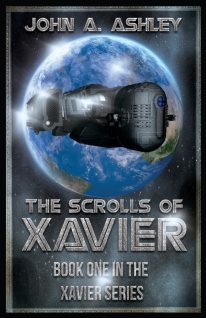 resources of this vast planet, known as Xavier997, may be the only hope a post-apocalyptic Earth has for survival. Upon arriving, however, the explorers of this promising new world soon discover that the treacherous and, most shockingly, inhabited realm of Xavier may also lead to mankind’s final undoing.
resources of this vast planet, known as Xavier997, may be the only hope a post-apocalyptic Earth has for survival. Upon arriving, however, the explorers of this promising new world soon discover that the treacherous and, most shockingly, inhabited realm of Xavier may also lead to mankind’s final undoing. In order to shed light on the dangerous secrets of this world, Captain Michael Dawn must lead a team of earth’s most skilled soldiers across its globe in search of five mysterious items known as the Scrolls. What seems like a routine mission, however, goes terribly wrong as Dawn and his team quickly realize that Xavier does not give up her treasures without a fight. To find the Scrolls, Captain Dawn must risk everything, including his love, his career, and his life.
Without the Scrolls, mankind's final hope is lost. With them, it might be even worse.
Links
Amazon e-book Print Audio book
Website/blog
Published on April 05, 2013 16:37
April 1, 2013
WHAT THE EXPERTS SAY: I Don’t Always Write Erotica by Scott Bury
 Scott Bury, Author
Scott Bury, AuthorONE SHADE OF RED
Welcome new-time erotica author Scott Bury, who today is launching his second novel ONE SHADE OF RED. The journalist/novelist explains why he made the switch from historical fantasy to erotica!
I don’t always write erotica. But when I do, I write it in one shade of red. By The most interesting writer named Scott Bury in the world.
My second novel, ONE SHADE OF RED, launches today. As you may have guessed, it’s a spoof of Fifty Shades of Grey, the mild erotica that has broken all the records for a first-time novelist, for a book about sex, and in fact for almost any work of fiction in English. Evaluations of the book’s quality tend to the extreme — readers and reviewers either love it or hate it.
I decided last fall that I would write a novel that turns Fifty Shades on its head. Some of my readers expressed surprise on my turn to the erotic. My first novel, The Bones of the Earth, is an epic historical fantasy. I’ve also published a children’s short story, “Sam, the Strawb Part,” and a couple of short stories that could be termed “urban paranormal,” such as “Dark Clouds.”
My readers shouldn’t have been so surprised, though, that there would be a lot of sex in my new work. (And I really mean, a lot of sex.) One of the criticisms of The Bones of the Earth is that it has “too much sex” and that the frank depiction of sex made it unsuitable for the “young adult” market.
Here’s the blurb:
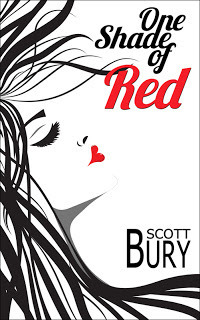
Women want the perfect man, so they can change him. But when university student Damian Serr discovers a rich, beautiful woman who’s voracious about sex, he doesn’t try to improve on perfection. It’s all that he can do to hold on for the ride.
Damian has always followed the rules, always tried to please others. At 20, he still dates the girl next door because his parents like her parents. When Nick, his university roommate, asks Damian to take over his pool-cleaning business so he can take an internship in London, Damian can't say no - especially to Nick's first and only client, a rich widow.
But widow Alexis Rosse is far from helpless or lonely. This beautiful financial genius is busy turning the markets upside-down, and she revels in sex wherever, whenever and with whomever she wants.
Over the summer, Alexis gives Damian an intense education. Day after day, she pushes him to his sexual limits. The only question he has is: will she break them?
Writing a book that describes sexual activity explicitly and to this extent did make me nervous. I was always conscious about staying on the right side of the fine line between erotica and porn. But to do that, I had to figure out where that line lay.
I cannot claim to be any kind of expert on porn or erotica. This is my second attempt at writing about sex at this extent. But it seems to me that while the point of porn is to depict sex in enough detail to stimulate the audience, with erotica, the purpose is to explore this very important aspect of the human experience and how it affects all other parts of living with other humans.
In any other form of fiction, the focus is on the characters and the story. In my previous work, I never shied away from depicting sex when it makes sense for those characters at that part of the story.
I also had to keep in mind that ONE SHADE OF RED is supposed to be a parody, a spoof. That means that it has to be fun, as well. What’s more fun than sex? And really, what is funnier than sex? People get up to all sorts of hilarious antics pursuing, avoiding, thinking about and engaging in sex. No wonder there are so many books, movies, TV programs, photographs, paintings and every other kind of expression about sex.
Taking up the challenge
One of my strengths as a writer is my ability to describe situations, actions, emotions and sensations in detail. I’m not just bragging: reviews of my previous books have mentioned how they felt they were right in the action and about the detail and description.
The only way I could pull off this kind of book was to use all the tools I have: the existing story; my basic concept about a young man and a slightly older but vastly more experienced woman; and all my writing skills, experience and knowledge.
I wrote ONE SHADE OF REDas well as I could. I also called upon the resources available through the authors’ cooperative, Independent Authors International (iauthorsi.org), for reaction, editing, proofreading, cover design and reviews. I also turned to the independent writing community through the Web and asked for help in raising the profile for my book in advance of its publication.
The community came through for me. I have to thank Gary Henry and my wife, Roxanne, for that first reaction to an early draft; Cinta Garcia de la Rosa for copy-editing; David C. Cassidy for a stunning cover; and Benjamin X. Wretlind and Bruce A. Blake for the final proofread.
As the launch date looms closer, I still feel nervous. I imagine that every writer does. Will readers like it? Will they understand the basic message I was trying to communicate? Will they find dozens (or more?) of typos and grammatical errors that my colleagues and I missed?
But ONE SHADE OF REDbrings another level of trepidation: will I be relegated to one category, on genre? Worse, will my small-but-hopefully-growing audience turn away from any of my future writing because this book is such a departure from my previous work?
And yes, I am concerned that my friends and family will think I’m some kind of pervert
The story
The defence against the perverted writer charge is simply this: it’s a story. Every book is a story, and ONE SHADE OF RED is the most basic, oldest story of all: boy meets girl.
I have just tried to write it as honestly as I can, with some humour and some attempts at insight into what people like my characters in the situations I put my characters into would think, feel and act.
Did I succeed? Did I make a lot of mistakes? Is the writing just plain bad? Or have I described believable people with believable reactions?
You be the judge.
About Scott Bury
Scott Bury is a journalist, editor and novelist based in Ottawa, Canada. His articles have appeared in magazines in Canada, the US, the UK and Australia, including Macworld, the Financial Post, Applied Arts, the Globe and Mail and Graphic Arts Monthly.
ONE SHADE OF RED is his second novel to be published.
His first published novel is The Bones of the Earth , a fantasy set in the real time and place of eastern Europe of the sixth century. He has also published a short story, Sam, the Strawb Part (proceeds of which are donated to an autism charity), and a paranormal story, Dark Clouds. His work in progress is tentatively titled Walking from the Soviet Union, and tells the true story of a Canadian drafted into the Red Army during the Second World War, his escape from a German POW camp and his journey home.
Scott Bury lives in Ottawa with his lovely, supportive and long-suffering wife, two mighty sons and the orangest cat in history.
Links
Amazon Smashwords Blog: Written Words Twitter @ScottTheWriterFacebook Website
Published on April 01, 2013 21:58
March 29, 2013
WHAT THE EXPERTS SAY: Suspense Author Ty Patterson
 Ty Patterson, Author
Ty Patterson, AuthorTHE WARRIOR
Suspense author Ty Patterson brings us THE WARRIOR, a thriller about a crime committed in the Congo and the “warrior” who chases those responsible. It “is fast-paced, with a great cast of characters,” according to one reviewer.
A “voracious” reader, Patterson started to write THE WARRIOR when his wife and son challenged him to do so. After all, it was on his “to do” list. Patterson believes that his experiences from living on several continents enrich his writing.
Don't miss the excerpt following the interview.
Q: What inspired you to write THE WARRIOR?
Ty Paterson: I have been writing for a long while, in the short story/humor piece format and even spent a stint as an advertising copywriter, which helped me hone my skills in packing a punch.
The idea to write a full length novel was on a wish list, but got a kick start when my better half and son suggested one night in December 2011 to stop making excuses, come out of my comfort zone, and start writing. The events in the Congo which form a backdrop to THE WARRIOR had stayed with me and when I started writing, those events became part of the book and THE WARRIOR was born.
Q: Many of your reviewers describe THE WARRIOR as “a gripping read.” How do you make your story “gripping?”
Ty Paterson: Yes, this feedback gratifies me immensely. I don’t think there is a formula for making a book gripping. If there is one, someone out there is rolling in it.
What I do is to write in the style that I like to read. So I like sparse prose, I like intense action sequences that are short, I like my characters to be driven by a purpose, a conscience, not ‘Dolph Lundgren’ action characters, and I like to write about themes that are big in scale.
I tried to bring all these together in THE WARRIOR and am grateful that my readers found my story gripping.
Q: How important is the setting in the Congo to telling your story?
Ty Paterson: Very. For my first book, I was very keen on writing a story based on a theme that had a large reach, global scale and that affected the emotions of people. I did not want to write about a bank heist or the theft of a nuclear weapon, or the Apocalypse… there are enough books out there on those themes. The Congo and those events were perfect for my story.
The other driver to having that setting was my own experience. I have lived in Asia where in many countries, women do not have a voice; where the system is so skewed and imbalanced that it will take decades for women to be recognized as equals. I wanted to have a champion who took on such a cause and Congo was apt.
Q: Besides “gripping,” your reviewers also mention how much they like your characters. “Ty Patterson skillfully weaves a clever thriller with an ex-soldier as a likeable male lead.” “I also really enjoyed the secondary characters a lot.” What makes your characters “likeable?”
Ty Paterson: When I read my first review with that description, I couldn’t stop grinning like a goofball for a week till my son reminded me not to inflict that look on him.
My characters are not Superman or Ironman, who do unbelievable feats. They are characters who believe in certain values and commit everything to those values. I think it is that aspect that makes my characters likeable to my readers. We live in a world where, especially in recent years, the rate of change is so fast that people change on an almost daily basis. So to read about a character that has a value system and holds steadfast to it is something my readers like in my opinion.
In terms of secondary characters, I have always been fascinated by movies/books that depicted a strong bond; Butch Cassidy and the Sundance Kid, Tango and Cash, for example, and I wanted to bring out this bond in my book. I think that has resulted in readers liking the secondary characters too.
Q: What makes a good villain?
Ty Paterson: A very good question that no one has asked me before. A villain is of course someone everyone hates, but does the villain have to be all evil? Does the villain have to have a background that resulted in his having a set of beliefs that are against societies? If villains do acts of good, do they become better villains?
Again, I think there is no formula to what makes a good villain. I think the character of the villain has to be dictated by the overall plot and that is how I created my villain.
And yes, I have sidestepped that question a bit because I haven’t a clue.
Q: Is THE WARRIOR a story to inform readers? Or to entertain?
Ty Paterson: Great question. I am a voracious reader and read anything from the labels on toilet paper rolls to books on quantum physics, economics, fiction, thrillers… anything that captures my mind.
I have learnt a lot from books that were pure entertainment and some of those facts stayed in my mind just because I read them in pieces of fiction. When I was in high school I read an Agatha Christie book that mentioned the corrosiveness of Sulphuric acid. Guess what? That has stayed in my mind all these years but I have forgotten all those chemistry classes and the experiments.
So the short answer is my book is primarily to entertain, however there are themes in my book that will be informative and will stay in readers’ minds. And in my very humble opinion, that should be what good entertainment is about.
Q: How helpful was your background to forming your story?
Ty Paterson: Very. If I had not spent some time in Asia, in all probability my book would have been in a totally Western milieu, with a different plot. My background has shaped the story for sure.
Q: Do you outline your stories or do your characters take over?
Ty Paterson: I am not one of those authors whose characters scream in their minds and make them rush to the keyboard to let those poor things out. I am less romantic that way.
I outline my stories, but it is a rough outline with some lines nonexistent or blurred. I am not sure if there are authors who write from a fully formed outline and structure right from the beginning. If there are, I would love to meet them.
My characters do influence the plot to some extent as I start writing, but in general I know the start, the end and the bits in between, so my characters do not radically alter the plot.
Q: What do you do when you’re not writing? Are you a dancer? Do you do standup comedy?
Ty Paterson: I would like to say that I am really born on Krypton and if you are lucky you might see me up in the sky with the cape and the red underpants. Unfortunately, in the world where bills and mortgages have to be paid, I work at a job that I love…however; I hope that my writing will enable me to write full time.
Readers, you know what I mean. Appreciate your love and please don’t stop showing it!
About Ty Patterson
Ty discovered reading at an early age and the backs of cereal cartons were frequently part of his reading diet when nothing else was at hand.
Reading has held him in thrall ever since. Reading takes him to multi textured worlds and fills his world with visual imagery; all fuelled just by the power of the black word on a white page.
He uses his life experiences, of living in a couple of continents, of selling tea to street side stalls, to infuse his writing. And to take his readers on the same flights of visual imagination that his favorite authors take him on.
Ty is privileged that his wife and son shape their lives to accommodate his writing. They also humor his ridiculous belief that he is in charge.
About THE WARRIOR
Zeb Carter is almost your average Private Military Contractor.
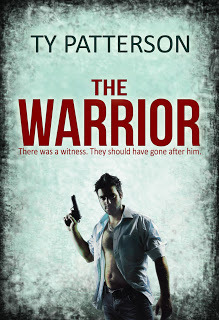 When working for a WDE (We Don't Exist) Agency, Zeb witnesses a gruesome crime in the Congo and tracks the perpetrators down to New York. Only to discover that not only are they protected by the FBI, but also are closely connected to a very high profile politician.
When working for a WDE (We Don't Exist) Agency, Zeb witnesses a gruesome crime in the Congo and tracks the perpetrators down to New York. Only to discover that not only are they protected by the FBI, but also are closely connected to a very high profile politician.Zeb can walk away from his hunt, or pursue it and put those close to him in the sights of the killers.
A thriller that spans Congo and New York, THE WARRIOR is dotted with gritty action, a central character that fuels imagination, and is also about the brotherhood of warriors.
Excerpt
It’s in Kindu, almost in the center of the DRC that he first hears of a group of contractors who have gone to the other side. The Congolese who mention them are fearful and whisper about mass rape and these contractors in the same breath. ‘La mal personnes’ and ‘atrocities’ are phrases used by them, describing the contractors as evil, committing atrocities. Many Ngok and Primus beers over several days and he hears that the contractors and the FDLR soldiers they are associated with are now based near Lake Kivu near the border with Rwanda. After all it’s quite difficult for 6 white men to blend in with black soldiers so they get noticed. The Congolese talk about a band of black and white soldiers who capture mines, often killing several mine workers and then looting the mines. Artisanal and small scale mining is wide spread in the DRC and because of the small scale of operations; it is very easy for armed bands of men to hijack the mines. The FDLR soldiers and the white skinned contractors roam across the mines, taking them over and trade in gold, minerals, diamonds, ivory, coffee, drugs, anything that has value. They prey on the local villages for food and women. The DRC’s army and police is either incapable of dealing with this force or is unwilling. Or, more likely, is in collusion. The UN Peace Keeping Force is usually too late to the scene and stretched too thin.
On a few occasions he is lucky to meet victims who have suffered at the hands of this band of soldiers. They all speak of the ruthlessness of the soldiers both black and white. He records his conversations with the Congolese victims and pretty soon has a dossier of atrocity. A few victims have even identified the mercenaries from their Agency photographs he is carrying. He has decided to visit a few villages in North and South Kivu before making his way back to Kinshasa and then back to the US.
And so he lies on the outskirts of Luvungi one of the villages in the vicinity of Lake Kivu. This is the third village near Lake Kivu that he has surveilled. It’s been a couple of hours since the trucks left, the jeep is still there, and nothing has changed. He does not know how many soldiers have gone in the trucks or how many have been left behind. He knows these have been the FDLR soldiers since he recognizes their uniforms, or soldiers impersonating them.
Of course he is going in; it isn’t in him to be a passive spectator. Andrews can go firetruck himself.
Book Links:
Amazon Kindle U.S. Amazon Kindle U.K. Smashwords Barnes & Noble Nook
Author Links:
Email: ty@pattersonty.comTwitter: https://twitter.com/typatterson67Blog Facebook
Published on March 29, 2013 15:00
March 22, 2013
WHAT THE EXPERTS SAY: Sci-Fi Author T. Allen Diaz
 T. Allen Diaz, Author
T. Allen Diaz, AuthorPROCYTHIAN REIGN
T. Allen Diaz brings us a “space opera” in his just-published novel PROCYTHIAN REIGN – a book described by one reviewer as “original and fresh.” Diaz admits that he dreamed his plot, and that he writes science fiction for the freedom it offers to develop setting and background.
Diaz describes himself as a typical family man. When he’s not writing, he spends as much time as possible with his family, serves as a firefighter, and loves to paintball. He is also a history buff with special interest in the American Civil War. PROCYTHIAN REIGN is his first novel.
Q: What inspired you to write PROCYTHIAN REIGN? Where did you get the idea?
T. Allen Diaz: That’s a really long story. I have always been a daydreamer and conjured stories that I found interesting. Sometimes I would fantasize about history, sometimes it would be a space story, and sometimes it would just be about a girl. But I was always one who could run off by myself in the woods or even the backyard and dream the day away.
So, years later, I’m a young adult. I’m newly married and living in this shoe box apartment saving for a house, and this friend-of-a-friend receives some major kudos from someone for this screenplay that he’s written about alien Shaolin Monks. It wasn’t my cup of tea, but it made me think that maybe I could do something with the story that I had rolling around in my head.
Well, I sat down and started writing by hand in this journal. It was terrible. It read like a bad scene from Star Wars and my good friend who read it was gracious enough to point that out. I was frustrated. I tried to sit down and think of a new direction: Why were these people interesting? What baggage did they bring? Where were they coming from? What obstacles could I give them along the way?
One night I’m asleep and have this dream: Four friends are living in this coastal town that’s being besieged by Man’o’War-type wooden sailing ships. Despite the Man’o’War thing, the friends were all watching TV and using phones, typical dream stuff. They’re pursued by a tyrannical king that was related to one of them. There’s a little more to the dream, but that might be a bit spoilerish, so we’ll leave it at that.
But, that began the ball rolling and three or four years later, the very rough first draft of PROCYTHIAN REIGN was complete.
Q: One of your reviewers writes that it is possible “to envision every setting.” Does your setting drive your characters? Is setting more important than your characters?
T. Allen Diaz: No, setting does not drive my characters. It is carefully chosen to fit the situation into which I want to place my characters, but it is chosen for them and the story, not the other way around.
Q: Given that you are writing science fiction, how do you get readers to buy into your premise? How important is credibility to your story?
T. Allen Diaz: Let me start by saying credibility is VERY important to me. It is important that my characters have credibility. It is important that the reader look at the society and its model and think: “that’s no stretch.” It’s important that the conflicts and motivations of my characters be iron clad and relatable.
That being said: PROCYTHIAN REIGN is a space opera, not hard science fiction. I go through some pretty great efforts to make the “science” plausible, but, like a cop reading a detective novel, an MIT physics professor would be sure to find some holes. I’m ok with that, though. It’s not the focus of the story.
Q: Why do you write science fiction? Are there other genres you would consider?
T. Allen Diaz: I write science fiction for the freedom of creating the setting and background however I want. It’s my hope that some tech and setting changes would make the PROCYTHIAN REIGN story fit nicely into Revolutionary France or Russia. But, I really feel like creating this new society that more closely reflects our reality makes it more relatable to people today.
As for other genres: I love spy and detective thrillers and am in the midst of writing a detective noire series set on a colonized moon. It will obviously have a sci-fi setting, but the story is all detective.
Q: How do you engage readers to care about your characters?
T. Allen Diaz: I strive to make them very believable and relatable. Most of the characters in my story have traits and characteristics that I’ve witnessed in the real world. I hope that will show to the reader and that he or she will begin to fret for the characters as they embark on this journey.
Suffering is also the name-of-the-game when it comes to engaging readers. I try to put my characters on a difficult and often dark path that will take its toll and make any development by these characters plausible while creating a real sense of drama regarding their safety. I’m not afraid to hurt or kill my characters. It is the only way to create the kind of high-stakes drama I’m seeking.
Q: Do your characters push you around and make you write what they want? Or are you in control?
T. Allen Diaz: You might discern from my last answer that this one is a resounding no. My characters do not push me around. It is my experience that we are all at the mercy of a universe that can be both gloriously wonderful and ruthlessly cruel. As such, any plot point or action must be plausible within that paradigm. Bad things happen to good people and good things happen to bad people. Karma doesn’t always come around to repay past sins or good deeds. And, sometimes it’s just better to be lucky than good. So, no one or nothing is “off limits.”
Q: What makes a hero/heroine? And on the flip side, what makes a villain? Who is your favorite villain?
T. Allen Diaz: The central underpinning of a hero or heroine is that the reader must care about him/her. If that doesn’t happen, the book will be closed for good before the second chapter. This means that the story should establish with haste who this person is and what his/her journey is going to be.
The hero must rise to face the challenge of this journey and (ideally) that journey should place him/her in unfamiliar waters. Any knight can win a jousting match. But make that knight leave the battlefield and have to pursue a political goal in court where head-on conflict is a liability and alliances are tenuous. That’s compelling. It’s a challenge. And, it creates the opportunity for the character to grow…or wilt.
As for villains: They are always more fun! I like my villains to be smart, sophisticated and deadly. A really good villain should have a certain “cool factor.” He should be competent and intelligent. He should also be interesting and relatable. One of the ways I try to do this is to make him deal with the same chaotic universe with which our heroes struggle. By mastering these elements, he becomes plausible and all-the-more menacing.
In PROCYTHIAN REIGN, that person is clearly Leo Krisminski. Leo is a mobster-turned-corporate-security. He seems affable and friendly and will smile to your face until the moment the blade punches into your back. He has street contacts and uses them to keep his finger on the pulse of Bravura City.
But, his corporate security chief responsibilities are constantly pulling him in directions outside his comfort zone. He must learn about starship combat ops and about raising and managing troops for far-flung covert ops. He must fight home-grown insurrectionists and tackle the expanding responsibilities of a wartime spy chief.
He is human, but he is a force to be reckoned with. I love Leo Krisminski. I had a lot of fun writing him and I love reading his scenes.
Q: Is your primary goal to entertain your readers or are you also trying to deliver a message?
T. Allen Diaz: I like to believe that good entertainment makes you think, but I don’t want to use PROCYTHIAN REIGN as a platform to preach my views to others. Yes, I have tried to make the story relevant to people of the time by creating a type of corporate aristocracy that could be seen as an extreme reflection of our socio-economic system today. And, yes, the haves vs. the have-nots is an even bigger part of our political dialogue today than it was when PROCYTHIAN REIGN was written a decade ago. But, other than using those elements as part of the canvas for telling this story, I have made no effort to advance a specific opinion about politics or our political system.
I like to think PROCYTHIAN REIGN does reflect our society and its setting is a plausible descendant of the one in which we live, but, again, that’s in the hope of making it something to which a reader can relate. I want readers to see this society for all of its flaws and say: “Yep, that could be us in two or three hundred years.” That makes the characters and their struggles more relatable. I want them to look at Eric Phillips’ life and say: “I understand how you could be so angry.” I want them to look at Laura and say: “Maybe the ‘finer things in life’ wouldn’t be as important to me, either.”
And then, I want that reader to keep turning page after page to find out where Eric’s anger and Laura’s sense of nobility takes each of them.
Q: Tell us something about yourself. What do you do when you’re not writing? Do you have a muse?
T. Allen Diaz: I’m just your typical family man who tries to spend as much time with my kids and fiancé as possible. I love paintball and try to play every chance I get. That’s not nearly as often as I’d like, but it’s a lot of fun.
I love to read and am fascinated by history. I like history from all different eras, though I’m definitely an unqualified Civil War buff.
I obviously like science fiction and enjoy Robert Heinlein’s Starship Troopers (the book), Scott Westerfield’s Succession series, George Orwell’s 1984 and especially AnimalFarm. I also like John Le Carre’s George Smile spy series. Dennis Lehane’s Patrick Kenzie series is a great read.
I’m already living one dream riding a fire truck every third day. I have taught EMS and still pull the occasional class until I can get my writing career in full swing. I have a very happy life.
As for a muse: I do have one friend (the one who told me my first story was like a bad Star Wars scene) that serves as the inspiration for Laura’s uncle, Louis. I borrow appearances or characteristics from real people that I know, but I don’t take people I know and transfer them into the story.
Regardless of commercial success, I love writing and will continue to do it until I can’t.
About T. Allen Diaz
T. Allen Diaz is a newcomer to writing. PROCYTHIAN REIGN is his debut novel, and the first book in the Proceena Trilogy. He is a life-long resident of the Tampa Bay Area where he serves as a firefighter. He has a wonderful fiancé, two wonderful daughters and a son who have all been instrumental in supporting this project.
About PROCYTHIAN REIGN
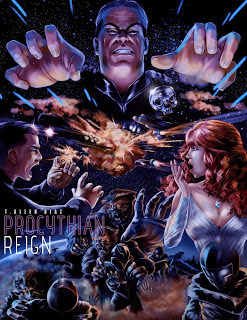 Proceena, corporate capital of the Procyon 2 System, a place where humanity lives a double life: One of opulent wealth, and one of crushing poverty. Now, these worlds will collide, forever changing the lives of those caught between them.
Proceena, corporate capital of the Procyon 2 System, a place where humanity lives a double life: One of opulent wealth, and one of crushing poverty. Now, these worlds will collide, forever changing the lives of those caught between them.Laura Clabar is the niece of the CEO of the reigning corporate authority. She lives a life of privilege and comfort. But, after falling for an idealistic, politically active indigo (Procythian working class), she begins to question if there is more to power and status than a life of creature comforts and luxury. Does she have a Noble Obligation to protect those less fortunate? Or, should she just go on living her life of opulence blind to the suffering of others?
Eric Phillips is an officer in the Guild of Proceena Workers, and a fiery, intense radical. He wants change and he wants it now. When a mysterious stranger comes into his life with an intriguing offer, it looks like he just might get it.
But, is there room for both of them in the Procyon System? Can an angry revolutionary work hand-in-hand with a sworn class enemy, or, will Laura soften his iron temperament? And, can they stay one step ahead of her uncle’s relentless henchman, Leo Krisminski, or will they end up as casualties of this would-be revolution?
Links
Purchase siteAmazon
Book trailer Blog Web site Facebook page
Goodreads
Twitter address Tallendiaz@proceenawriter
Published on March 22, 2013 17:00
March 15, 2013
WHAT THE EXPERTS SAY: Fiction Author, Cinthia Ritchie
 Cinthia Ritchie, Author
Cinthia Ritchie, AuthorDOLLS BEHAVING BADLY
Cinthia Ritchie seems to have a thing against Barbie dolls. In her recently-published novel DOLLS BEHAVING BADLY, her main character is a single mom of a gifted eight-year-old in Alaska. That's not too unusual, but to support herself and her son she has many jobs, including as “an artist who secretly makes erotic dolls for extra income.” One reviewer says her book is “A story you’ve never heard before, and one you won’t forget.”
Ritchie is a former journalist whose career is full of awards. She lives in Alaska where she enjoys the “indescribable” joy of running.
Don’t miss the excerpt following her interview.
Q: What caused or inspired you to write DOLLS BEHAVING BADLY?
Cinthia Ritchie: I was a single mother working two jobs and attending graduate school and my guilty pleasure was sitting in the bathroom at night and reading novels (the bathroom was the warmest room in our draft house). One night as I was reading “Diary of a Mad Housewife” I thought, wait a minute, this woman is stressing out and she has a husband, a housekeeper and no money worries.
That’s when the idea of a single mother writing a diary came into my head. A few nights later, I imagined or perhaps actually saw the ghost of my Polish grandmother (I was in the bathroom again), and the voice of the book swam through my head.
Q: OK – I can’t resist. Did you grow up with Barbie dolls? Or were you more of a Cabbage Patch doll person?
Cinthia Ritchie: I grew up with Barbie dolls, though I rarely got to play with the “good” models, since I had two older sisters and one younger. I usually got stuck with Midge or the Barbies with crappy hair. I do remember eating the shoes, though. It was my way of getting back at my older sisters. I’d swallow one of those oh-so-tiny shoes, and sit there smiling as they frantically searched. Later that night, though, I’d lie in bed terrified I was going to die. So I guess I’ve always had it in for Barbie.
Q: How important is humor to telling your story?
Cinthia Ritchie:Humor is very fickle. If you overdo it, it can easily kick you in the butt, and the last thing you want to do is turn off readers. The voice behind “DOLLS BEHAVING BADLY” naturally developed with a humorous tone—I didn’t really have to work at it. Really, I think it was my way of cheering myself up and resolving inner conflict over many of the choices I had made. The book isn’t overtly autobiographical yet I think we always write for a purpose: To make sense of our lives and the lives around us.
Q: One of your reviewers said: “An out-of-the-ordinary setting and cast of characters are the backbone of Ritchie’s compelling debut novel.” How important is setting to telling your story?
Cinthia Ritchie: Living in Alaska is like nowhere else. Even though Anchorage is a city with big-box stories and traffic problems, it’s unique. Moose stumble down the streets in the winter. Bears are sighted in city parks. You can see whales while walking the beach late summer evenings. It’s pretty amazing. You are constantly reminded how small you are, and how immense nature is. It’s very liberating, and very grounding.
Mostly, living in Alaska is a dichotomy between beauty and danger. You are always aware of this, and maybe that’s why people feel free to shuck off pretensions and simply be themselves. We are an odd lot up here, and I wouldn’t want it any other way.
Q: Do you have heroes and villains? Or are your characters some of both?
Cinthia Ritchie: I think we are always our own heroes and villains, and I wanted my characters to reflect that. Just as we don’t always like ourselves, we don’t always like the people we love and we don’t always like our characters, either, or agree with their choices. But we still love them. I wanted to transfer this philosophy over to my readers, I wanted them to know that it was okay if they didn’t like Stephanie or Sandee, didn’t like how they spoke or acted, as long as (and this was so, so important to me) they loved them.
Q: You have spent a considerable amount of time as a journalist. How transferrable were writing skills from journalism to fiction? Which do you enjoy more – writing fiction or reporting?
Cinthia Ritchie: Oh, fiction without a doubt. I also love creative nonfiction and poetry but reporting is simply what I did to pay the bills. I enjoyed it as a job, yes, and it offered opportunities to do and experience amazing things: Walk on glaciers, fly in float planes over mountains, kayak across Resurrection Bay. Yet fiction is my true love. I’ll put it this way: I wouldn’t report without a paycheck. But fiction and poetry? Honey, you don’t have to give me money, just give me a laptop and the time to write.
Q: Do you write to entertain, inform and/or influence?
Cinthia Ritchie: Influence first, and inform secondary. I think that fiction offers readers an invaluable lesson: The chance to see and feel the world through someone else’s perspective. And really, isn’t that why we read in the first place? It’s that same curiosity that causes us to look in other people’s windows when we walk our dogs at night. We are all voyeurs. We all need the reassurance that we share something with those around us.
Q: When you’re not writing, what are you doing? How important is running in your life?
Cinthia Ritchie: Oh, I do love running so, so much. In the summers I’m out running in the mountains and on the trails every night. It feeds something deep inside of me, something essential and wild. It brings me such joy. There’s nothing like running mountain trails in the Alaska summer twilight, no one else around and all of that silence. It’s indescribable, really.
I also love to hike, read, swim, write (of course), walk my dog on the beach, work out and take naps.
About Cinthia Ritchie
Cinthia Ritchie is a former journalist and Pushcart Prize nominee who lives and runs mountains in Alaska.
She’s a recipient of two Rasmuson Individual Artist Awards, a Connie Boocheever Fellowship, residencies at Hedgebrook, Kimmel Harding Nelson Center for the Arts and Hidden River Arts, the Brenda Ueland Prose Award, Memoir Prose Award, Sport Literate Essay Award, Northwest PEN Women Creative Nonfiction Award, Drexel Magazine Creative Nonfiction Award and Once Written Grand Prize Award.
Her work can be found in New York Times Magazine, Sport Literate, Water-Stone Review, Memoir, Under the Sun, Literary Mama, Slow Trains Literary Journal, Sugar Mule, Breadcrumbs and Scabs, Third Wednesday, Writer’s Digest, Foliate Oak Literary Magazine, Cactus Heart Press and over 30 other literary magazines and small presses.
Her debut novel, DOLLS BEHAVING BADLY, released Feb. 5, 2013 from Grand Central Publishing/Hachette Book Group.
About DOLLS BEHAVING BADLY
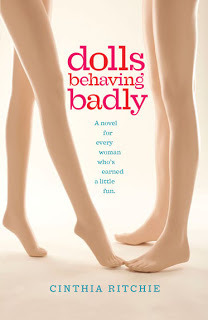 Carla Richards is a lot of things. She’s a waitress at Anchorage’s premier dining establishment, Mexico in an Igloo; an artist who secretly makes erotic dolls for extra income; a divorcee who can’t quite detach from her ex-husband; and a single mom trying to support her gifted eight-year-old son, her pregnant sister, and her baby-sitter-turned-resident-teenager.
Carla Richards is a lot of things. She’s a waitress at Anchorage’s premier dining establishment, Mexico in an Igloo; an artist who secretly makes erotic dolls for extra income; a divorcee who can’t quite detach from her ex-husband; and a single mom trying to support her gifted eight-year-old son, her pregnant sister, and her baby-sitter-turned-resident-teenager.She’s one overdue bill away from completely losing control-when inspiration strikes in the form of a TV personality. Now she’s scribbling away in a diary, flirting with an anthropologist, and making appointments with a credit counselor.
Still, getting her life and dreams back on track is difficult. Is perfection really within reach? Or will she wind up with something even better?
ExcerptThursday, Sept. 15
This is my diary, my pathetic little conversation with myself. No doubt I will burn it halfway through. I’ve never been one to finish anything. Mother used to say this was because I was born during a full moon, but like everything she says, it doesn’t make a lick of sense.
It isn’t even the beginning of the year. Or even the month. It’s not even my birthday. I’m starting, typical of me, impulsively, in the middle of September. I’m starting with the facts.I’m thirty-eight years old. I’ve slept with nineteen and a half men.
I live in Alaska, not the wild parts but smack in the middle of Anchorage, with the Walmart and Home Depot squatting over streets littered with moose poop.
I’m divorced. Last month my ex-husband paid child support in ptarmigan carcasses, those tiny bones snapping like fingers when I tried to eat them.
I have one son, age eight and already in fourth grade. He is gifted, his teachers gush, remarking how unusual it is for such a child to come out of such unique (meaning underprivileged, meaning single parent, meaning they don’t think I’m very smart) circumstances.
I work as a waitress in a Mexican restaurant. This is a step up: two years ago I was at Denny’s.
Yesterday, I was so worried about money I stayed home from work and tried to drown myself in the bathtub. I sank my head under the water and held my breath, but my face popped up in less than a minute. I tried a second time, but by then my heart wasn’t really in it so I got out, brushed the dog hair off the sofa and plopped down to watch Oprah on the cable channel.
What happened next was a miracle, like Gramma used to say. No angels sang, of course, and there was none of that ornery church music. Instead, a very tall woman (who might have been an angel if heaven had high ceilings) waved her arms. There were sweat stains under her sweater, and this impressed me so much that I leaned forward; I knew something important was about to happen.
Most of what she said was New Age mumbo-jumbo, but when she mentioned the diary, I pulled myself up and rewrapped the towel around my waist. I knew she was speaking to me, almost as if this was her purpose in life, to make sure these words got directed my way.
She said you didn’t need a fancy one; it didn’t even need a lock, like those little-girl ones I kept as a teenager. A notebook, she said, would work just fine. Or even a bunch of papers stapled together. The important thing was doing it. Committing yourself to paper every day, regardless of whether anything exciting or thought-provoking actually happens.
“Your thoughts are gold,” the giant woman said. “Hold them up to the light and they shine.”
I was crying by then, sobbing into the dog’s neck. It was like a salvation, like those traveling preachers who used to come to town. Mother would never let us go but I snuck out with Julie, who was a Baptist. Those preachers believed, and while we were there in that tent, we did too.
This is what I’m hoping for, that my words will deliver me something. Not the truth, exactly. But solace.
Links
Website Facebook Twitter: https://twitter.com/cinthiaritchie1
Purchase links:Amazon Barnes & NobleIndieBound
Published on March 15, 2013 15:14
March 8, 2013
WHAT THE EXPERTS SAY: Author F.C. Malby
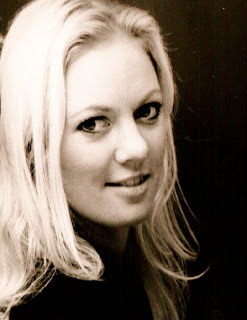 F.C. Malby, Author
F.C. Malby, AuthorTAKE ME TO THE CASTLEWelcome F.C. Malby who joins us to talk about her recently-released book TAKE ME TO THE CASTLE. Malby wrote her novel to inform people about “a time in history which has shaped much of Eastern Europe" -- February 1993 in the newly formed Czech Republic. Malby has personal experience with the turbulent times following the fall of communism. She taught English there as a teenager.
Originally from East Anglia, UK, Malby has travelled extensively and taught English in the Philippines and London in addition to the Czech Republic. She was a wedding photographer and teacher before becoming a writer. She likes to bake and experiment with recipes, which help to inspire her.
Q: What caused or inspired you to write TAKE ME TO THE CASTLE? Where did you get the idea?
F.C. Malby: I spent several months teaching English in the Czech Republic as a teenager just after the walls came down and it was an experience that will never leave me. The changes were rapid and many people were afraid of the freedom that they had been given and afraid of the changes in their lives and their country. There was a security in having 100% employment and in knowing the rules but I found it unsettling.
Q: One of your reviewers said, “F.C. Malby has managed to bring history to life through the eyes of her well-crafted characters” Did you create your characters to tell a story, or did your setting drive your characters?
F.C. Malby: The setting definitely drove the characters. I wanted to write about the Velvet Revolution and the fall of the Berlin Wall and to look at how those changes impacted the lives of ordinary people.
Q: How do you make your characters engaging?
F.C. Malby: You have to get inside their heads and to think the way they do. Engaging characters often have character flaws or are driven by a particular need and it is important to keep this in mind.
Q: Do you have heroes and villains? Or are your characters some of both? What are the characteristics of heroes and villains?
F.C. Malby: I think both and neither. The story has a wider arc of good and bad set within a very complex time in history. The narrative is more about what a situation will drive a character into without their willingness to actually go there.
Q: You have traveled extensively. Does travel help you envision stories?
F.C. Malby: Absolutely. Setting is key to a good novel and you have to know a place, whether it be real or imaginary. If you are using a real location, you really need to know the details: the feel of the place, the sights, sounds and smells which the reader needs to be able to experience through your words alone. Without this the story is only two-dimensional.
Q: Do you write to entertain, inform and/or influence?
F.C. Malby: I would say hopefully to inform and influence, but writing has to be entertaining to engage the reader. I wrote TAKE ME TO THE CASTLE to give people an idea about a time in history which has shaped much of Eastern Europe. It is a period about which very little fiction has been written and I believe it is an important jigsaw piece in a distant landscape. Prague has changed almost beyond recognition. When I was there in the depths of winter, you didn’t hear a single western voice and there were no vegetables, just meat, dumpling and wonderful cake. Now Prague has become very westernized.
Q: What is your ultimate goal as a writer?
F.C. Malby: To grow, develop, and to continue to bring fresh ideas into print. When someone emails or contacts me to say that they loved the book it makes the hard work worthwhile. I write because I love to write and I want to be the best that I can be so it takes work. I will continue to read and learn the craft.
Q: When you’re not writing, what are you doing?
F.C. Malby: I ski when it’s cold enough. I am also a photographer and an artist. I love to paint and to travel and take photographs. I also enjoy film and theatre which inspires my writing. It is important to take time away from work, especially if you work from home. I bake and experiment with recipes. That is often when the next idea strikes.
About F.C. Malby
F.C. Malby grew up in East Anglia, in the UK, and has taught English in the Czech Republic, the Philippines and London. She gained a First Class BA (Ed.) Honours Degree in Geography and Education, and became a teacher and a wedding photographer before beginning her writing career. Her first novel, TAKE ME TO THE CASTLE, published in December 2012, has been nominated for The People's Book Awards. She is currently working on short stories and further novels.
About TAKE ME TO THE CASTLE
 The door opened slowly, and she could see the outline of five men standing in the corridor. Her room was far enough away from the figures for no one to notice her nose pressing into the door frame. She was aware of her own breathing and tried to slow it down, slow down her heartbeat until she was invisible. The idea in these moments is to be completely invisible. There were a lot of invisible people in Prague, doing invisible things to other invisible people.
The door opened slowly, and she could see the outline of five men standing in the corridor. Her room was far enough away from the figures for no one to notice her nose pressing into the door frame. She was aware of her own breathing and tried to slow it down, slow down her heartbeat until she was invisible. The idea in these moments is to be completely invisible. There were a lot of invisible people in Prague, doing invisible things to other invisible people.What would you do to secure your own freedom?
February 1993. Walls between East and West have dissolved, following the Velvet Revolution of 1989. It is a harsh winter in the newly formed Czech Republic, but the nation celebrates. Arriving in Letovice, Jana is trying to escape a personal loss and come to terms with the changes in her country and in her own life. She stays with the Martineks and meets their son, Miloš. When he leaves Letovice and she travels back to Prague, she encounters a deep and shocking betrayal. Jana meets Lukas, a conservator working on the restoration of a mosaic at the Cathedral of St Vitus. But who is he and what is he hiding?
An evocative portrayal of life during the fall of communism: It is a sometimes heartbreaking tale of deception, distrust and the need for redemption in the aftermath of a regime in which no one can be trusted, not even someone you thought you knew.
Links
Amazon UK
Amazon US
GoodreadsFacebookTwitter @fcmalbyBlogWebsite http://fcmalby.comBook trailer
Published on March 08, 2013 16:32
March 3, 2013
KILLER THRILLER: Let’s Play Villain by Melissa Foster
 Melissa Foster, Author
Melissa Foster, AuthorTRACES OF KARABest-selling author Melissa Foster, who is launching her newest book TRACES OF KARA, joins us to explore the fun of being a villain. She challenges us to find a friend and go play VILLAIN. See how many badass traits the two of you can assign to one evil dude.
Let's Play Villainby Melissa Foster
How fun would it be to throw caution to the wind and do all the naughty things you have only thought about or worried over? Wouldn’t it be fun to tell off those that anger you without any need for restraint? How about pummeling the bullies who are bothering your kids? Bank robbery could be fun for some. Or maybe you want to dress the part, too. Throw on leather and chains and pull up on your Harley, smokin’ a doobie and drunk off your butt? To each his own, right? Obviously we cannot go around doing all of those things…but our fictional villains can. And where are villains born? In our clever little minds. So, let’s play villain.
What do you wish you could do? Who do you wish you could be? Would it be cool to be as cunning as Hannibal Lector? How about as badass as the Terminator? Or maybe your villain would go all Shades of Gray and their whip might be used for other things. Whatever your pleasure, don’t fret over being a hated villain, try being an empathetic villain! Maybe you’re misunderstood and you’ve gone over to the rough side of town because of that. When I create villains, I always give them some redeemable qualities. I like to be conflicted over my hatred of their evil doings. How about you?
Our dear readers are so precious to writers, because you are the ones we try to entice, excite, and surprise. Your enjoyment is a writer’s motivation and inspiration. So share your fave villains with us! Who did you love to hate? Who could you simply not get past?
Here’s a fun (and weird) game for you to take away with you. Find a close friend and play VILLAIN. No, don’t go out and rob banks or pummel people in real life, but come up with who your villain might be, what they might look like, then combine them with your friend’s villain and see what you come out with. I think you’ll be surprised at how complex a villain can be, and brainstorming with friends only makes the villain more interesting.
My villain in TRACES OF KARA was derived from many sources and conversations with friends and readers—and I adore him.
Ready to play? Ready? Set? Go!
Melissa Foster is the award-winning author of three International bestselling novels. Her books have been recommended by USA Today's book blog, Hagerstown Magazine, The Patriot, and several other print venues. She is the founder of the Women’s Nest, a social and support community for women, the World Literary Café. When she's not writing, Melissa helps authors navigate the publishing industry through her author training programs on Fostering Success. Melissa has been published in Calgary’s Child Magazine, the Huffington Post, and Women Business Owners magazine. Melissa also hosts an annual Aspiring Authors contest for children and has painted and donated several murals to The Hospital for Sick Children in Washington, DC.
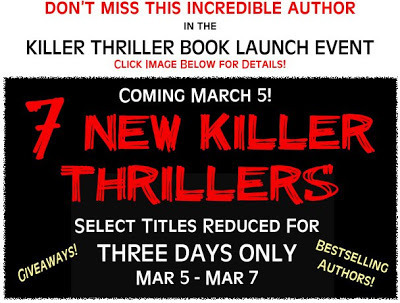 Click here for more information on new Killer Thrillers
Click here for more information on new Killer Thrillers
Published on March 03, 2013 22:23
March 2, 2013
KILLER THRILLERS: Giacomo Giammatteo
 Giacomo Giammatteo, Author
Giacomo Giammatteo, AuthorMURDER HAS CONSEQUENCESThriller author Giacomo Gaimmatteo joins us to talk about his newest book MURDER HAS CONSEQUENCES to be launched shortly.
MURDER HAS CONSEQUENCESby Giacomo Giammateo
MURDER HAS CONSEQUENCES is the second book in the Friendship & Honor series.I know it seems odd to be talking about murder in the same sentence as friendship and honor, but that is exactly what this series explores. It’s about two guys who grew up as best friends, almost brothers, but one became a cop and one a hit man.Did you ever wonder how far you can push friendship before it snaps?Thirty years ago, four boys swore an oath to be friends forever, and to always have each others’ back. In Murder Takes Time—the first book in the series—that oath pushed one of the boys to an early grave and one into hiding. Only two of them are left, but the oath remains.Nicky Fusco’s words set the theme for the second book:“Oaths are something you swear to when you’re young, and wish you hadn’t when you get old.”How far would you go to honor an oath made when you were 8-years old? How much would you sacrifice? Suppose it meant breaking a promise to your wife? Or to God?When Detective Frankie Donovan gets in trouble—and the law can’t help him—he turns to his best friend, Nicky Fusco. The problem is that Nicky promised his family, and God, that he’d go straight.Most people don’t think of criminals as having honor; these stories might change your mind.~~~~ Giacomo Giammatteo is the author of MURDER TAKES TIME, MURDER HAS CONSEQUENCES, and A BULLET FOR CARLOS. He lives in Texas where he and his wife have an animal sanctuary with 41 loving “friends.”
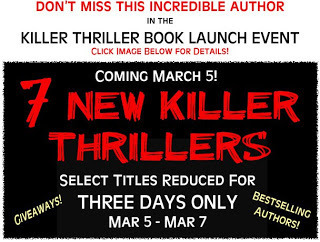 Click here for details to go to Killer Thriller Book Launch Event
Click here for details to go to Killer Thriller Book Launch Event
Published on March 02, 2013 21:03
March 1, 2013
WHAT THE EXPERTS SAY: Pop Culture Mystery Author Maya Pruett
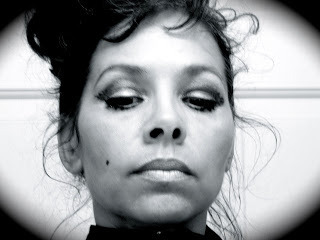 Maya Pruett, Author
Maya Pruett, AuthorTHE CAT FOOD CHRONICLES
If you enjoy humor, you’ll want to meet Maya Pruett and her book, THE CAT FOOD CHRONICLES, a mystery about two psychic sisters and a psychic cat. Yes, it’s a mystery – although not in the traditional sense of mysteries. She offers this warning: “This book is not a cozy formulaic type mystery. It is completely ridiculous.” Fellow fans of The City will be pleased to know it is set in San Francisco. Yay!
In addition to her writing, Maya is an actress and make-up artist. She has been professionally entertaining people for over 25 years. She received the 2008 Santa Barbara Writers Conference Endowed Scholarship Award, launched by the late great Ray Bradbury. She writes in many genres.
Don't miss the excerpt following the interview.
Q: What inspired you to write about “two psychic sisters and a psychic cat” solving a mystery from the perspective of the cat?
Well, my friend Tom who was a serious cat lover, who by the way just passed … Hi Tom luv ya! Anywho, Tom kept chiding me to take care of this little cat named Puka, who needed a guardian for a bit while its mom was away. So, one day I was hanging out and this Puka came up to me looking all cute and fluffy. I remember (and this is all true) but I remember saying to her, “You ain’t suckin me in little kitty!”
Well, she ignored me and laid down by my side and started purring her love right into my rib cage. It was a really trippy feeling and I took it as a sign to let her into my life. So basically, Puk’s was the inspiration for the book, but the book started out as a poem called Pukahontas and can be found on my website. From the poem it turned into a book after I met this cat named Spooky, who by the way does have hair like I describe in the book. Interesting note, both these cats were owned by my friend Lily who was my inspiration for one of the twins.
Anyway, to make a short story long, Puky and I hung out for two years. She was so unusual and would follow me everywhere. For instance, one day I went down to the corner store, then on to Kaimana Beach, a beach that I used to hang out at. Later that night about midnight one of my friends asked, “Where’s Puky?”
I looked around and then remembered she had followed me to the store that afternoon. I threw on some shoes and walked down to the store and sure enough, Puky jumps down from a tree and comes over and rubs on my leg. She had been waiting there all day thinking I was coming back from the store. She was such a trip, and boy do I miss her. Puky was really something. I’m quite sure she was sent to watch over me and ultimately inspire me to write this series.
Q: Why a six-part serial rather than a book?
It's both, meaning that I have a complete novel up as well. Still, I wanted to do parts because of the book’s title and also I wanted to give people a chance to buy the first part at a price-point that was super affordable. I charge $1.99 per part, but if you want to get the complete novel you can purchase that for $9.99 and save $2.00!
The book is really ridiculous and way out there. I really suggest people look inside and read some of it before they buy it. I am getting some very interesting feedback and have found, either people love it or hate it. I even put a warning disclaimer at the beginning of the description on Amazon. I did this because some people are expecting it to be a cozy formulaic style mystery, and it is far from that.
It's rather unusual, with a Hunter S. Thompson sort of stream of consciousness type narration and there is some strong to mild language as well. I tell people, if you like the show 30 Rock or authors like Christopher Moore and Carl Hiaasen then you've come to the right place.
Q: How helpful is San Francisco as a setting?
A lot. I was raised in California and my family lives in the Bay Area, so San Fran is forever ingrained in my memories of growing up. It's such a neat town, with neat people, and neat smells. I remember wondering one time when I was younger ... just exactly what kind of people pull into a harbor and see hill after hill that look like a rollercoaster and say, “Let's build a city here.”
Of course, now as an adult, I realize that the pioneers that built that majestic city are my kind of people, and really, how could you not build there, I mean look at the back drop one had to work with. Redwoods, mountains, and the pacific ocean. Not bad huh?
Q: What makes your characters credible and compelling? What makes your readers care about your characters?
I think what makes them compelling is that they are funny and honest. They are not afraid to debate politics, tell long winded stories, or tell each other off. The lead character, a psychic cat named Spooky Sinclair, is a nut but she's really quite personable so you feel like she is someone you could dance with, drink with, eat with, and solve a crime with.
As for credible, the only semblance of credibility these clowns have is their humanity. Because there is something quite real about a perimenopausal twin yelling insults at a cat.
Q: In a fantasy world, what pulls in your readers? Characters? Back story? Suspense? How important is believability?
I want both my characters and story to pull you in. First my characters have to be interesting, which does not necessarily mean likeable. Of course, they have to have some redeeming qualities but I like characters that grow. I find it much more satisfying to start out with a few serious flaws and then make that arch that all good stories end with.
I have had some readers get turned off because they start thinking that when the story goes to a dark place, and mind you, nothing in this story is that dark, but they think that when the book diverts from its regular scheduled programming of funny, ha ha, C'est la vie type attitude, they get uncomfortable. I really want to tell them, keep reading, it all comes round but most likely not the way you would expect, and I must say, I think that is absolutely what is good about the book, what makes it suspenseful and interesting.
For me believability is twofold because THE CAT FOOD CHRONICLES is so out there. It's comedy and good comedy has to be played straight. So yes, believability is important but you must not let it get in the way of your sense of fun.
Q: Do your characters push you around and make you write what they want? Or are you in control?
I'd say definitely, my characters are on their own program, which I love. Some characters really come to life. It's wild because you don't expect them to have such a strong voice. That's what happened to the character Tameron in this first book. I had no idea she was going to become so dominate. It was so unexpected and I really quite enjoyed it. I have fallen in love with her character and so I gave her a lot of good lines.
Q: What makes a hero/heroine? And on the flip side, what makes a villain?
I'll have to site Mick Jagger. Who by the way, is in the book, but I agree when he sings.“Because every cop is a criminal, and all the sinners saints.”
I like heroes that aren't perfect but are trying. And I like my villains that way too. I don't like one note anything. Now, the degree in which a character can live with his or her actions, is to me, what's interesting.
Q: Tell us something about yourself. What do you do when you’re not writing? Do you have a muse? If you weren’t a writer, what would you be?
I'm like most writers, I love to hang out in book stores and libraries. I love movies and music, and I consider the universe my muse. I talk to it like my friend and I have raised my hand and asked it to send through some inspirational, creative concepts and ideas. So far so good!
ExcerptChapter OneSpooky
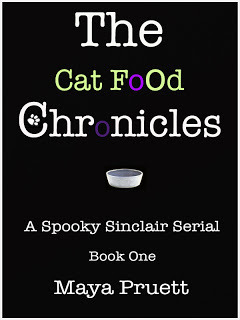 I know this sounds weird, but I can read lips. Of course, you're probably thinking, why would a cat want to read lips? A fair question and the answer is I don't. The fact is, I can't hear so great. I can read minds though, how's that for a wing-dinger? Yep, I'm telepathic, so really the hearing impediment thing isn't much of a problem, and well, actually I tend to only read lips if I'm preoccupied. Guess who was preoccupied? I was all curled up on the Lazyboy under the big palm watching my favorite show on the boob tube. Lily was on the phone, imagine that, and things were getting a little nutty for Batman and the Boy Wonder. It seems, Batman and the Boy Wonder were just about to be sawed in half when I happened to glance up to see Lily say that she needed a CAT Scan. At first, I thought she said cat scam, I mean who would she need me to scam? I'm not that kind of cat anyway, how dare she even insinuate such a thing. But then she said it again. "Yes, I'm sure Holly, a CAT Scan!" Holy scantonese noodles Batman, what the hell do you think I need to be scanned for? I've got all my shots. I've been de-wormed twice this year, and this is the fourth time I have made my claws grow back. I can make my claws grow back. I have serious mental powers, plus I read a book by Ernest Holmes called, The Science of the Mind which gave me some great ideas like growing my claws back. I'd recommend it to Oprah.I hopped off the Lazyboy and went into the kitchen and circled around Lily's legs, but Lily just kept blabbing away about scanning me. I glanced at the TV where a giant maniacal saw was whirling steadily toward the dynamic duo. It was too much, I couldn't concentrate, CAT Scan overload, so I beat it out of there.I sprinted out into the cool night air glad to be away from even the idea of a scanning. I was hungry as usual, which meant I needed a San Francisco treat, and let me tell you, I wasn't thinking about Rice a Roni. I licked my soon to be grubby little paws and made my way down the north-face fire escape. I live in an area that many years ago housed dockworkers and fisherman. The area is called Telegraph Hill, and there are a lot of cats in the neighborhood. The building I live in is called The Old Brown. Lily and Holly inherited it. They're lucky as hell too boy, because this is prime San Francisco real estate. We more or less remodeled The Old Brown ourselves. It took us about twelve years. Holly lives up top and Lily lives bottom side.I was thinking. It's always nice to get out of the house, when I came to The Greenwich Stairs. I looked around really good; the coast seemed clear, but just in case I shot down em like a rocket. The stairs are The Greenwich Street Stairs and they're famous. About three months ago some ass-lip kicked me down them, and my ribs still hurt from the tumble. Humans are often cruel. Anyway, I don't want to think about that. I want to think about Batman. I luv Batman; he's hot, although he looks like a cat to me, in fact, he looks like this cat I know who lives down in Chinatown. This cat's got the longest ears ever, real pointy too. But dig this, his owner makes him wear a black cape during the winter, hence Batman. It's waterproof so that's good since it's always frickin raining, but the poor dude looks ridiculous. People are weird. Thank god it wasn't raining tonight. I stopped on stair one hundred and thirty-two or whichever, lifted my nose to the moon and smelled the city, boy what a city. I don't ever count the stairs. Holly counts them every time she walks up or down them, how OCD is that? I thought about going into Chinatown, but I was feeling a little too wacky still. Chinatown at night is nowhere to be for a cat. Anything can happen in Chinatown, like cat chow fun for one. I joke, but I really dig the way the Chinese, do medicine. Think about this, the Chinese have had some three thousand odd years of holistic healing. That's some serious shi ... atsu!Okay, so I decided to head up to North Beach and kill two birds with one stone, Italian called. For the nine lives of me, I can't figure out why most cats like to eat birds and all that other foul crap. No pun intended. Truly though, why eat a bird when you can eat a slice of pizza? Yep, North Beach it is. I figured I'd do research for Lily's newest entrepreneurial exercise, which could actually make us rich. And let's be clear, that's a goal in our household.Lily and Holly are super cool. They look exactly alike, but they act completely different. Still, no matter how differently they behave, they sure got that twin thing going. I can't really call them my owners, and I doubt they would call me their pet; we're more like best friends. I'm welcome to stay at their house anytime and eat whatever I want. So I have ... for about the last nineteen years.We all met the year after the girls graduated from high school. Lily had been dating this guy who was a Scientologist. He was really super cute, Rob Lowe cute, except he had long wavy hair. Lily likes rockers. It didn't last though, because it was pure lust on Lil's part. One day, he asked her to marry him. She said yes, but on their wedding day Lily lost her nerve and told him in good conscience, he was beautiful, but she did not love him. He took it hard but was really quite cool about it. Now, this is where I come in. The cutie Scientologist had gotten her a cat because Scientology wedding tradition suggests a cat as a wedding present. They also suggest a pan and a comb ... I was in good company. Lily was quite touched that he still wanted her to have me as a non-official wedding present, and they remained friends for many years until he moved to Hollywood to be a movie star. I don't think that panned out, although we did see him on a soap opera for a season. He wasn't a bad actor, but he had cut his beautiful hair, and it made Lily cry every time we watched him. Okay, I'm getting side tracked. Let me tell you a bit about myself, and then I'll tell you about how I am going to make Holly and Lily rich. I am a small and unusual looking cat. I have honestly never seen a cat that looks like me. I'm hard to explain, but I'll try. First, I am not much bigger than when she got me, so I look like a kitten, though I am by no means a kitten. I look under fed, which is a laugh, and I incite feelings of pity in most people, except the jerk off that kicked me down the stairs. My eyes are rather piercing in my very small head, and they are the precise color that you see on the advertising poster for the play Cats. True story, I once me t a transvestite wearing a shiny gold lame' jacket the same color of my eyes. His name was Geoffrey, and he draped me over his shoulder and wore me to a block party in The Castro I was a huge hit!
I know this sounds weird, but I can read lips. Of course, you're probably thinking, why would a cat want to read lips? A fair question and the answer is I don't. The fact is, I can't hear so great. I can read minds though, how's that for a wing-dinger? Yep, I'm telepathic, so really the hearing impediment thing isn't much of a problem, and well, actually I tend to only read lips if I'm preoccupied. Guess who was preoccupied? I was all curled up on the Lazyboy under the big palm watching my favorite show on the boob tube. Lily was on the phone, imagine that, and things were getting a little nutty for Batman and the Boy Wonder. It seems, Batman and the Boy Wonder were just about to be sawed in half when I happened to glance up to see Lily say that she needed a CAT Scan. At first, I thought she said cat scam, I mean who would she need me to scam? I'm not that kind of cat anyway, how dare she even insinuate such a thing. But then she said it again. "Yes, I'm sure Holly, a CAT Scan!" Holy scantonese noodles Batman, what the hell do you think I need to be scanned for? I've got all my shots. I've been de-wormed twice this year, and this is the fourth time I have made my claws grow back. I can make my claws grow back. I have serious mental powers, plus I read a book by Ernest Holmes called, The Science of the Mind which gave me some great ideas like growing my claws back. I'd recommend it to Oprah.I hopped off the Lazyboy and went into the kitchen and circled around Lily's legs, but Lily just kept blabbing away about scanning me. I glanced at the TV where a giant maniacal saw was whirling steadily toward the dynamic duo. It was too much, I couldn't concentrate, CAT Scan overload, so I beat it out of there.I sprinted out into the cool night air glad to be away from even the idea of a scanning. I was hungry as usual, which meant I needed a San Francisco treat, and let me tell you, I wasn't thinking about Rice a Roni. I licked my soon to be grubby little paws and made my way down the north-face fire escape. I live in an area that many years ago housed dockworkers and fisherman. The area is called Telegraph Hill, and there are a lot of cats in the neighborhood. The building I live in is called The Old Brown. Lily and Holly inherited it. They're lucky as hell too boy, because this is prime San Francisco real estate. We more or less remodeled The Old Brown ourselves. It took us about twelve years. Holly lives up top and Lily lives bottom side.I was thinking. It's always nice to get out of the house, when I came to The Greenwich Stairs. I looked around really good; the coast seemed clear, but just in case I shot down em like a rocket. The stairs are The Greenwich Street Stairs and they're famous. About three months ago some ass-lip kicked me down them, and my ribs still hurt from the tumble. Humans are often cruel. Anyway, I don't want to think about that. I want to think about Batman. I luv Batman; he's hot, although he looks like a cat to me, in fact, he looks like this cat I know who lives down in Chinatown. This cat's got the longest ears ever, real pointy too. But dig this, his owner makes him wear a black cape during the winter, hence Batman. It's waterproof so that's good since it's always frickin raining, but the poor dude looks ridiculous. People are weird. Thank god it wasn't raining tonight. I stopped on stair one hundred and thirty-two or whichever, lifted my nose to the moon and smelled the city, boy what a city. I don't ever count the stairs. Holly counts them every time she walks up or down them, how OCD is that? I thought about going into Chinatown, but I was feeling a little too wacky still. Chinatown at night is nowhere to be for a cat. Anything can happen in Chinatown, like cat chow fun for one. I joke, but I really dig the way the Chinese, do medicine. Think about this, the Chinese have had some three thousand odd years of holistic healing. That's some serious shi ... atsu!Okay, so I decided to head up to North Beach and kill two birds with one stone, Italian called. For the nine lives of me, I can't figure out why most cats like to eat birds and all that other foul crap. No pun intended. Truly though, why eat a bird when you can eat a slice of pizza? Yep, North Beach it is. I figured I'd do research for Lily's newest entrepreneurial exercise, which could actually make us rich. And let's be clear, that's a goal in our household.Lily and Holly are super cool. They look exactly alike, but they act completely different. Still, no matter how differently they behave, they sure got that twin thing going. I can't really call them my owners, and I doubt they would call me their pet; we're more like best friends. I'm welcome to stay at their house anytime and eat whatever I want. So I have ... for about the last nineteen years.We all met the year after the girls graduated from high school. Lily had been dating this guy who was a Scientologist. He was really super cute, Rob Lowe cute, except he had long wavy hair. Lily likes rockers. It didn't last though, because it was pure lust on Lil's part. One day, he asked her to marry him. She said yes, but on their wedding day Lily lost her nerve and told him in good conscience, he was beautiful, but she did not love him. He took it hard but was really quite cool about it. Now, this is where I come in. The cutie Scientologist had gotten her a cat because Scientology wedding tradition suggests a cat as a wedding present. They also suggest a pan and a comb ... I was in good company. Lily was quite touched that he still wanted her to have me as a non-official wedding present, and they remained friends for many years until he moved to Hollywood to be a movie star. I don't think that panned out, although we did see him on a soap opera for a season. He wasn't a bad actor, but he had cut his beautiful hair, and it made Lily cry every time we watched him. Okay, I'm getting side tracked. Let me tell you a bit about myself, and then I'll tell you about how I am going to make Holly and Lily rich. I am a small and unusual looking cat. I have honestly never seen a cat that looks like me. I'm hard to explain, but I'll try. First, I am not much bigger than when she got me, so I look like a kitten, though I am by no means a kitten. I look under fed, which is a laugh, and I incite feelings of pity in most people, except the jerk off that kicked me down the stairs. My eyes are rather piercing in my very small head, and they are the precise color that you see on the advertising poster for the play Cats. True story, I once me t a transvestite wearing a shiny gold lame' jacket the same color of my eyes. His name was Geoffrey, and he draped me over his shoulder and wore me to a block party in The Castro I was a huge hit!
About Maya Pruett
Maya likes to count chickens before and after they're hatched, attempt car repossession alone at night, debate television personalities while in her living room, and of course speed-walk! She is the creator of Spooky Sinclair, the lead character in the delightfully ridiculous, six-part serial novel, The Cat Food Chronicles.
Maya is a writer, actress, and make-up artist with national and international credits. She has been professionally entertaining people for over 25 years, and was the recipient of the 2008 Santa Barbara Writers Conference Endowed Scholarship Award, launched by the late great Ray Bradbury.
Maya writes in many genres, including fiction, non-fiction, children's, and young adult. If you would like to learn more about Maya, please visit her website or follow her on Twitter, Facebook or her blog.
Title The Cat Food Chronicles: Book One (A Spooky Sinclair Serial) Author Maya Pruett Genre Pop-Culture Mystery Publisher Worthington Press Publishing House Release Date: 01/29/2013 ASIN/ISBN: B0099IDKCE / 978-0-9882890-6-2 Purchase Link: http://www.amazon.com/Cat-Food-Chronicles-Complete-ebook/dp/B00B85DQ7A/ref=sr_1_7?s=books&ie=UTF8&qid=1361581204&sr=1-7&keywords=maya+pruett Author/Book Website: www.mayapruett.com Twitter/Facebook: https://twitter.com/mayapruett https://www.facebook.com/mayapruett Book Description:
An award wining novel about two psychics sisters, one psychic cat, an irkily handsome detective, and a dead celebutante!... WARNING ... THIS BOOK IS NOT A COZY FORMULAIC TYPE MYSTERY. IT IS COMPLETELY RIDICULOUS, MUCH LIKE THE TV SHOW 30 ROCK AND IS WRITTEN IN A CRAZY STREAM OF CONSCIOUSNESS STYLE, ALA HUNTER S. THOMPSON. IF YOU LIKE AUTHORS THAT ARE WAY OUT THERE, LIKE CHRISTOPHER MOORE AND CARL HIAASEN THEN YOU'VE COME TO THE RIGHT PLACE.
Reading Level: Adult & Young Adult (16 & up)
Synopsis: Following in the footsteps of Britney, Lindsey, and the likes, Callie Bryant, Hollywood's newest bad girl, comes to town as the lead in the much awaited Romeo and Juliet ... the Rock Opera. When Callie actually dies on stage, Lily, Holly and Spooky (two psychic sisters and one psychic cat) get together with the irkily handsome, yet musically inclined Detective Richardson to solve the crime.Set in San Francisco, The Cat Food Chronicles is a story of cats, crime, cuisine, and lol comedy. DiscountYou can buy The Cat Food Chronicles in two ways.Part 1-6 for $1.99 a piece … or the complete novel for $9.99.
You save two dollars if you buy the complete novel!
Published on March 01, 2013 16:07
February 27, 2013
KILLER THRILLERS: Submerge Yourself in the World of Cheryl Kaye Tardif
 Cheryl Kate Tardiff, Author
Cheryl Kate Tardiff, AuthorSUBMERGEDWelcome Cheryl Kaye Tardif, international bestselling author. Cheryl is getting ready to launch her newest book SUBMERGED and explains in the following article why you might want to consider reading her on-the-darkside thriller.
Submerge Yourself in the World of Cheryl Kaye Tardifby Cheryl Kaye TardifWhen people ask me what I do, I like to tell them: "I kill people off for a living." You can imagine the looks I get. Sometimes I'll follow with: "Fictitiously, of course. I'm a suspense writer." Sometimes I won't say anything else. Yeah, I'm bad that way.Writing thriller, suspense, mystery and/or crime novels has always been my passion—especially if I throw a pinch of supernatural or paranormal into the mix. I've always been drawn to dark stories, ones that raise the hairs on the back of my neck or make me glance over my shoulder. The two greatest influences in my writing life have been Dean Koontz and Stephen King. Need I say more?So what can I offer you if you choose to read my books? I hope and strive to give you a satisfying read, one that will impact you emotionally. If I can make you shudder or tremble or wince or even cry, then I've done my job.In SUBMERGED, I share with you a very personal fear of mine—the fear of being in a car that's underwater and not being able to get out. I have traveled long distances by car hundreds of times during my life, twice from one coast of Canada to the other. Whenever we're along a stretch of highway with a body of water beside me, my fear kicks in. And I hold my breath…waiting…praying…I want you to relate to this fear. But even more, I want my characters to come to life. I want you to feel for Marcus Taylor, a struggling recovering addict who has had his fair share of grief and guilt. I want you to admire his strength, even in the midst of his weaknesses. I want you, dear reader, to feel compassion for this man who has lost his wife and son in a terrible accident, who blames himself for their deaths, and who is searching for redemption, though he doesn't really know he is.I want you to cheer on Rebecca Kingston, a mother on the verge of divorce who has left an abusive husband. I want you to feel empathy for her because this decision, no matter what others think, is not an easy one to make. I want you to cry with her when she realizes she is physically unable to help her children who are trapped with her in a sinking vehicle. And I want you to be holding your breath every time Rebecca does.Marcus and Rebecca (and the others in SUBMERGED) may only be characters on paper, but they feel real to me. I gave "birth" to them and watched them grow. With every step they took, I wiped away their tears, hugged them and loved them. And, dear reader, I sincerely hope you'll love them just as much.Happy reading…with the lights on…Cheryl Kaye Tardif, international bestselling authorPS: The Kindle edition of SUBMERGED is available on Amazon from March 4th – 6th for a special price during the Killer Thriller Book Launch.Learn more about me and connect at: http://www.cherylktardif.com http://www.twitter.com/cherylktardif https://www.facebook.com/pages/Cheryl...
 Click here to go to Killer Thriller
Click here to go to Killer Thriller
Published on February 27, 2013 21:03



